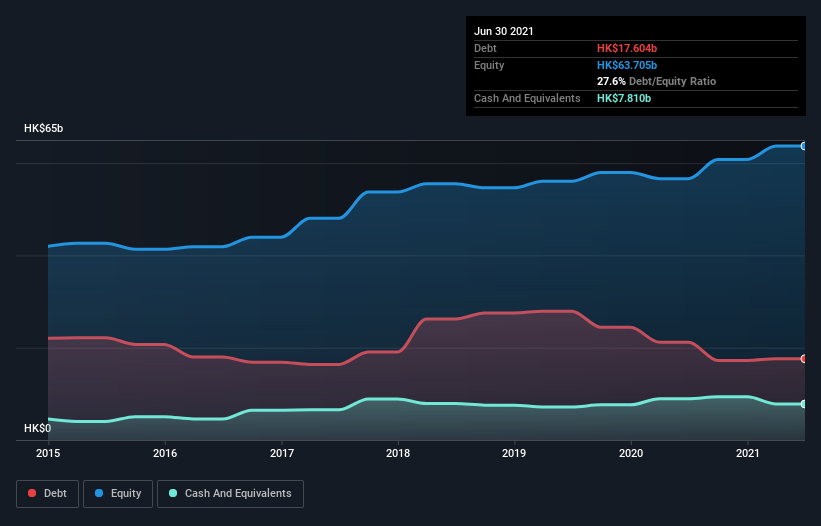Does Kingboard Holdings (HKG:148) Have A Healthy Balance Sheet?

Howard Marks put it nicely when he said that, rather than worrying about share price volatility, 'The possibility of permanent loss is the risk I worry about... and every practical investor I know worries about.' When we think about how risky a company is, we always like to look at its use of debt, since debt overload can lead to ruin. Importantly, Kingboard Holdings Limited (HKG:148) does carry debt. But should shareholders be worried about its use of debt?
Why Does Debt Bring Risk?
Debt is a tool to help businesses grow, but if a business is incapable of paying off its lenders, then it exists at their mercy. Ultimately, if the company can't fulfill its legal obligations to repay debt, shareholders could walk away with nothing. While that is not too common, we often do see indebted companies permanently diluting shareholders because lenders force them to raise capital at a distressed price. Of course, plenty of companies use debt to fund growth, without any negative consequences. When we examine debt levels, we first consider both cash and debt levels, together.
See our latest analysis for Kingboard Holdings
How Much Debt Does Kingboard Holdings Carry?
You can click the graphic below for the historical numbers, but it shows that Kingboard Holdings had HK$17.6b of debt in June 2021, down from HK$21.2b, one year before. However, it does have HK$7.81b in cash offsetting this, leading to net debt of about HK$9.79b.

How Strong Is Kingboard Holdings' Balance Sheet?
According to the last reported balance sheet, Kingboard Holdings had liabilities of HK$29.8b due within 12 months, and liabilities of HK$4.04b due beyond 12 months. Offsetting this, it had HK$7.81b in cash and HK$16.0b in receivables that were due within 12 months. So it has liabilities totalling HK$9.98b more than its cash and near-term receivables, combined.
Kingboard Holdings has a market capitalization of HK$38.9b, so it could very likely raise cash to ameliorate its balance sheet, if the need arose. But we definitely want to keep our eyes open to indications that its debt is bringing too much risk.
In order to size up a company's debt relative to its earnings, we calculate its net debt divided by its earnings before interest, tax, depreciation, and amortization (EBITDA) and its earnings before interest and tax (EBIT) divided by its interest expense (its interest cover). This way, we consider both the absolute quantum of the debt, as well as the interest rates paid on it.
Kingboard Holdings has a low net debt to EBITDA ratio of only 0.69. And its EBIT covers its interest expense a whopping 78.4 times over. So we're pretty relaxed about its super-conservative use of debt. On top of that, Kingboard Holdings grew its EBIT by 83% over the last twelve months, and that growth will make it easier to handle its debt. When analysing debt levels, the balance sheet is the obvious place to start. But it is future earnings, more than anything, that will determine Kingboard Holdings's ability to maintain a healthy balance sheet going forward. So if you want to see what the professionals think, you might find this free report on analyst profit forecasts to be interesting.
But our final consideration is also important, because a company cannot pay debt with paper profits; it needs cold hard cash. So we clearly need to look at whether that EBIT is leading to corresponding free cash flow. During the last three years, Kingboard Holdings produced sturdy free cash flow equating to 65% of its EBIT, about what we'd expect. This free cash flow puts the company in a good position to pay down debt, when appropriate.
Our View
Kingboard Holdings's interest cover suggests it can handle its debt as easily as Cristiano Ronaldo could score a goal against an under 14's goalkeeper. And the good news does not stop there, as its EBIT growth rate also supports that impression! Looking at the bigger picture, we think Kingboard Holdings's use of debt seems quite reasonable and we're not concerned about it. While debt does bring risk, when used wisely it can also bring a higher return on equity. There's no doubt that we learn most about debt from the balance sheet. However, not all investment risk resides within the balance sheet - far from it. Case in point: We've spotted 1 warning sign for Kingboard Holdings you should be aware of.
When all is said and done, sometimes its easier to focus on companies that don't even need debt. Readers can access a list of growth stocks with zero net debt 100% free, right now.
Valuation is complex, but we're here to simplify it.
Discover if Kingboard Holdings might be undervalued or overvalued with our detailed analysis, featuring fair value estimates, potential risks, dividends, insider trades, and its financial condition.
Access Free AnalysisThis article by Simply Wall St is general in nature. We provide commentary based on historical data and analyst forecasts only using an unbiased methodology and our articles are not intended to be financial advice. It does not constitute a recommendation to buy or sell any stock, and does not take account of your objectives, or your financial situation. We aim to bring you long-term focused analysis driven by fundamental data. Note that our analysis may not factor in the latest price-sensitive company announcements or qualitative material. Simply Wall St has no position in any stocks mentioned.
Have feedback on this article? Concerned about the content? Get in touch with us directly. Alternatively, email editorial-team (at) simplywallst.com.
About SEHK:148
Kingboard Holdings
An investment holding company, manufactures and sells laminates, printed circuit boards (PCBs), magnetic products, and chemicals in the People’s Republic of China, rest of Asia, Europe, and the United States.
Flawless balance sheet second-rate dividend payer.
Similar Companies
Market Insights
Community Narratives



